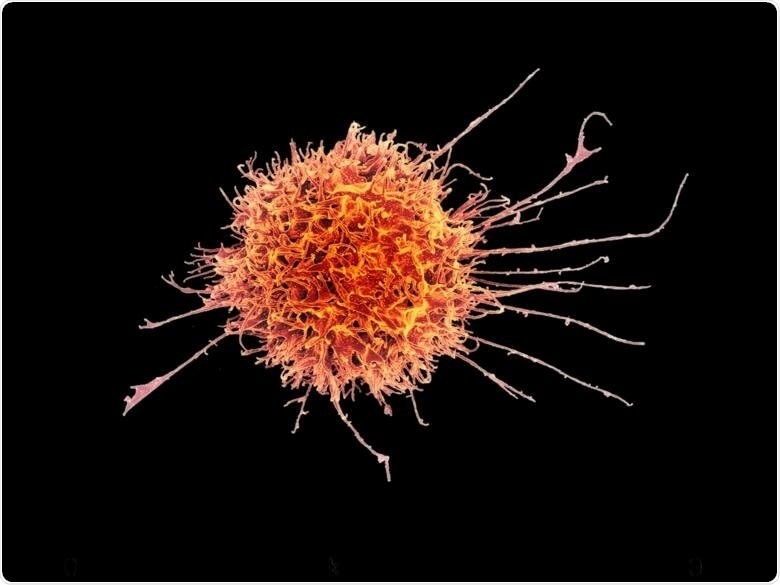Little is understood until today on how the immune system’s natural killer (NK) cells identify which cells are infected with SARS-CoV-2. An international research team led by Karolinska Institute scientists has discovered that NK cells respond to a specific peptide on the exterior of infected cells.

NK cells are part of the innate immune system. Image Credit: National Institute of Allergy and Infectious Diseases.
The study is an important part of the equation in understanding how the immune system responds to COVID-19. The paper was published in the journal Cell Reports.
NK cells are white blood cells that are part of the immune system. Unlike cells in the adaptive immune defense, they can identify and destroy cancer cells and virus-infected cells without having encountered them earlier. This potential is managed by a balance of stimulating and inhibiting receptors on the surface of NK cells, which can respond to various molecules on the surface of other cells.
The virus is revealed by a peptide
A recent study explains why certain NK cells become activated when they come into contact with a cell infected with SARS-CoV-2. The virus-infected cells contain a peptide that chemically reacts in NK cells that have a specific receptor, NKG2A that can identify the peptide.
Our study shows that SARS-CoV-2 contains a peptide that is displayed by molecules on the cell surface.”
Quirin Hammer, Researcher, Center for Infectious Medicine, Karolinska Institute
“The activation of NK cells is a complex reaction, and here the peptide blocks the inhibition of the NK cells, which allows them to be activated. This new knowledge is an important piece of the puzzle in our understanding of how our immune system reacts in the presence of this viral infection,” Hammer adds.
Karolinska Institute, Karolinska University Hospital, and research labs and universities in Italy, Germany, Norway, and the United States teamed up extensively on the research. The first stage was to place their hypothesis to the test using computational models, which were then confirmed in the research facility.
The decisive phase was the infection of human lung cells with SARS-CoV-2 in a controlled setting, which allowed researchers to show that NK cells with the specific receptor are more activated than NK cells without it.
Monitoring new virus variants
These findings are important to our understanding of how immune cells recognize cells infected with SARS-CoV-2. This may become significant when monitoring new virus variants with the aim to determine how well the immune system responds to them.”
Quirin Hammer, Researcher, Center for Infectious Medicine, Karolinska Institute
The study is now being followed up with the support of a biobank at Karolinska University Hospital and Karolinska Institute that contains samples of blood from over 300 people who were treated for COVID-19 during the pandemic’s first wave.
“We’ll be examining if the composition of NK cells a person has contributes to how severe their symptoms are when infected with SARS-CoV-2,” Hammer adds.
Source:
Journal reference:
Hammer, Q., et al. (2022) SARS-CoV-2 Nsp13 encodes for an HLA-E-stabilizing peptide that abrogates inhibition of NKG2A-expressing NK cells. Cell Reports. doi.org/10.1016/j.celrep.2022.110503.